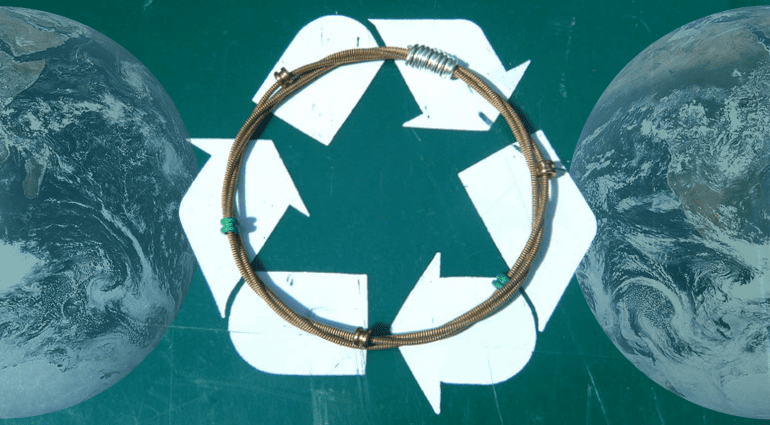
It’s International Earth Day and we’d like to take this opportunity to give you some ideas on how to be more environmentally friendly as a musician. Here we have compiled 8 different ideas on how to reduce, reuse, recycle and up-cycle in the context of a musician’s life as well as that of a consumer.
?
Disclaimer: By no means are we trying to convey that Thomann is a 100% eco-friendly business, stating this we would be hypocritical. Our business consists of bringing musical instruments, gear and accessories to you and your loved ones. The processes involved require energy, fuel and packing materials. As a socially responsible business we are doing what we can to reduce our ecological footprint by using recycled / recyclable packaging for our shipments, promoting recycling in our facilities and offices, using only NABU– and BUND-approved Green electricity and by remaining conscious of the impact we have on the planet. Let’s all work together to make the Earth a cleaner place and we hope these small tips will help with that, even if slightly..
♻️
8. Use an AC adapter for pedals
7. Recycle Your Used Strings
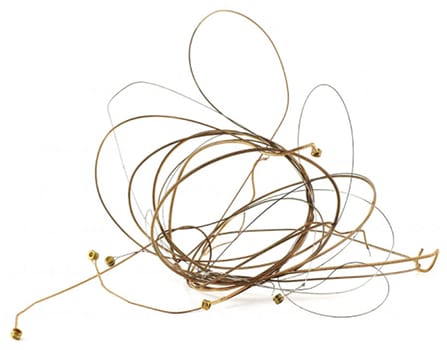 Unfortunately, it’s true that strings cannot be recycled in many countries but there are initiatives, by very few brands, that strive to recycle strings through customer reward programs. One example of this is D’Addario‘s Playback program. Customers can mail back their used guitar strings, for free, and earn points which can later be used towards purchases. This service is only available in the USA, for now, but other brands have similar programs in Europe, such as Warchal Strings‘ recycling program for violin, viola, cello strings.
Unfortunately, it’s true that strings cannot be recycled in many countries but there are initiatives, by very few brands, that strive to recycle strings through customer reward programs. One example of this is D’Addario‘s Playback program. Customers can mail back their used guitar strings, for free, and earn points which can later be used towards purchases. This service is only available in the USA, for now, but other brands have similar programs in Europe, such as Warchal Strings‘ recycling program for violin, viola, cello strings.6. Choose products with less packaging
 Being a responsible consumer is not easy but there are decisions we can make that will reduce waste and pollution. Some brands use fancy (and excessive) packaging to convince the buyer to buy their product. If enough people choose the products with less packaging then other brands will notice the trend and do the same. This could lead to a significant reduction of waste in the musical gear industry. If you have no choice, remember that paper is always better than plastic (a plastic bottle, for example, takes 450 years or more to decompose naturally!).
Being a responsible consumer is not easy but there are decisions we can make that will reduce waste and pollution. Some brands use fancy (and excessive) packaging to convince the buyer to buy their product. If enough people choose the products with less packaging then other brands will notice the trend and do the same. This could lead to a significant reduction of waste in the musical gear industry. If you have no choice, remember that paper is always better than plastic (a plastic bottle, for example, takes 450 years or more to decompose naturally!).5. Choose an eco-friendly material
- Brass,
- steel
- or wooden snare drum?
4. Upcycling / Repurposing Used Strings
Guitar and bass strings can be used for many purposes after they have served the guitarist or bassist and lost their desired tone. If you are crafty, or know someone who is, remember that old strings can be repurposed to make home decorations, necklaces, bracelets, rings or earrings. If you type “guitar string jewellery” into Google image search you will see various examples of this sustainable and creative process. Try it yourself, the sky’s the limit!
3. Biodegradable / Compostable Products
 There are several brands which make instruments and accessories strictly from biodegradable / renewable materials. Some examples are Timber Tones picks made from wood, leather and stone particles (see images below) or saxophone reeds made from hemp fibre, a very strong yet biodegradable material (see image to the left). Other small steps you can take are choosing wooden tips for your drumsticks in stead of plastic ones, choosing natural materials for your guitar/bass strap instead of synthetic ones and opting for naturally finished instruments instead of heavily painted ones (many types of paint are toxic pollutants). These are just a few small conscious steps we can take in protecting ecosystems, wildlife and our own human race.
There are several brands which make instruments and accessories strictly from biodegradable / renewable materials. Some examples are Timber Tones picks made from wood, leather and stone particles (see images below) or saxophone reeds made from hemp fibre, a very strong yet biodegradable material (see image to the left). Other small steps you can take are choosing wooden tips for your drumsticks in stead of plastic ones, choosing natural materials for your guitar/bass strap instead of synthetic ones and opting for naturally finished instruments instead of heavily painted ones (many types of paint are toxic pollutants). These are just a few small conscious steps we can take in protecting ecosystems, wildlife and our own human race.
- Wooden picks
- Stone picks
2. Upcycling / Repurposing Other Gear
Not sure if you remember our #DIY posts from a few years back, but there are many ways to reuse your old gear to create beautiful new things like home decorations. For example lamps or lampshades made from used or cracked cymbals or a doghouse made from an old kick drum (see photos below)! What else can you think of? Put your creativity to the test…
1. Write Songs with an Ecological Message
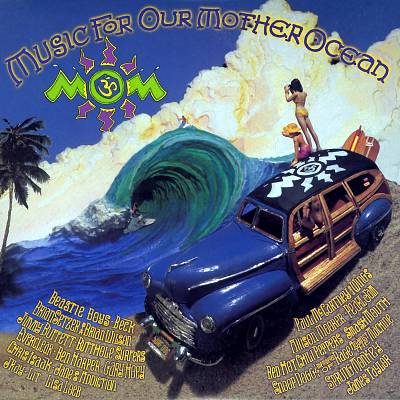 It’s nothing new, think Joni Mitchell’s “Big Yellow Taxi”, but songs with an ecological message can have a huge impact. When someone really likes your song they often take your lyrics to heart. It’s not easy to write a “tree-hugger” song without making it sound cliché or cheesy, but this could be a fun #challenge for you or your band. There are already many songs with messages relating to the Earth and protecting it, the lyrics are often poetic or too cryptic to even tell! You might be surprised by this list of songs with an ecological message. There are also compilation albums from which the sales are used to support non-profit environmental organisations such as the Surfrider Foundation (see album art to the left). To motivate you here is a short documentary about this album and about ocean preservation (it’s a bit dated but the message is still strong and pertinent). Enjoy!
It’s nothing new, think Joni Mitchell’s “Big Yellow Taxi”, but songs with an ecological message can have a huge impact. When someone really likes your song they often take your lyrics to heart. It’s not easy to write a “tree-hugger” song without making it sound cliché or cheesy, but this could be a fun #challenge for you or your band. There are already many songs with messages relating to the Earth and protecting it, the lyrics are often poetic or too cryptic to even tell! You might be surprised by this list of songs with an ecological message. There are also compilation albums from which the sales are used to support non-profit environmental organisations such as the Surfrider Foundation (see album art to the left). To motivate you here is a short documentary about this album and about ocean preservation (it’s a bit dated but the message is still strong and pertinent). Enjoy!
Do you have any other ideas or suggestions on how to be a more eco-friendly musician? Any criticisms of our ideas? Fire away in the comments!
Happy Earth Day!
9 comments
Leave a Reply
You are currently viewing a placeholder content from Facebook. To access the actual content, click the button below. Please note that doing so will share data with third-party providers.
More InformationYou are currently viewing a placeholder content from Instagram. To access the actual content, click the button below. Please note that doing so will share data with third-party providers.
More InformationYou are currently viewing a placeholder content from X. To access the actual content, click the button below. Please note that doing so will share data with third-party providers.
More Information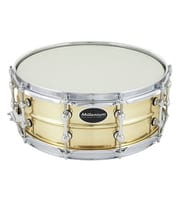


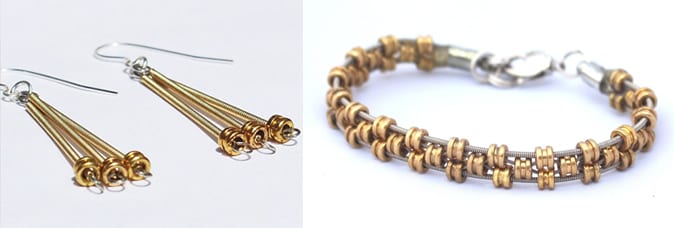
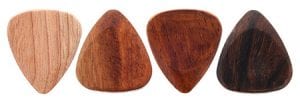
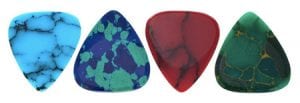













Stephen Astronaut says:
Do a public transport or bicycle tour. Probably for acoustic or laptop musicians only 🙂
Joe says:
> That’s a really fun idea Stephen! Highly possible these days. Thanks for your suggestion. //Joe
Tomas says:
Great article, Joe! Personally, I am not a musical instrument player, but having a few children being musicians, this article really hit me in a highly positive way. It is not just something to think about but a lot to do about! Very encouraging! Thanks for the suggestions; as for me, a special thank-you goes towards those Upcycling/Repurposing Used Strings and Other Gears!
Everyday should be EARTH DAY!
All the best to you, Joe, and all at THOMANN! Keep up the great job!
Joe says:
> Thanks a lot for your positive feedback and encouragement Tomas! Much appreciated. And you’re absolutely right that everyday should be Earth Day, it is for me! 🙂
All the best, //Joe
Jess says:
There is also a range called Pits & Bits in Denmark and the UK. Which is a range of “Towel off” Shampoos and Soaps that allows you to wash effectively without additional water or rinsing. Perfect for avoiding showers, which have a huge impact on the environment.
Joe says:
> Thanks Jess! We do waste a lot of water don’t we?! Thanks for the tip!
Best, //Joe
Victor says:
“6. Choose products with less packaging” – As far as I am aware (maybe I haven’t look deep enough), this is not really an option in Thomann.de yet. There is no way to know how much packaging there is when I order a product, or to be able to compare between two similar products. It would be great if Thomann could create a filter or a way for us to know which products have less packaging or are packed with biodegradable materials.
Joe says:
Hi Victor,
This is a great idea. I will send it along to my superiors and we’ll see what we can do. Have a nice day! //Joe
Robben says:
Hi Joe, I’m glad to anounce our European music string recycling program. Please join us at StringSavers.eu
Cheerz,
Robben